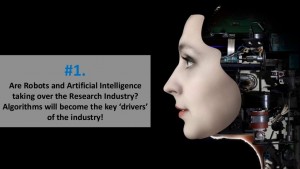By Katia Pallini
One of the popular formats at conferences are panel discussions; and although their start is always interesting, for some reason I always get lost along the way (you possibly have similar experiences). Keeping the entertainment level high during those discussions is a true challenge.
This is why Best of ESOMAR – Belgium wanted to try out a new format during their event which took place last Thursday December 15. The concept? Well, you could label it ‘the court case for research statements’. The audience was divided into two camps functioning as the lawyers – for each statement, one side had to come up with arguments ‘pro’, while the other side represented the ‘defense’. After both sides presented their arguments, the jury took the floor (in this case represented by three people from the client side, namely Kornel Muller from Unilever, Stan Knoops from IFF and Koen Van Parijs from Esploro), where after the judge (in this case Finn Raben, ESOMAR Director General) summarized the discussion and declared who won the round.
I must admit that, when they first introduced the concept, I secretly regretted being in the room. I joined the session expecting to sit back and relax and listen to a thought-provoking discussion. So at first the thought of playing an active role in a debate scared me off a bit. But let’s zoom in on one of the arguments presented at the event: “Are robots and AI taking over the research industry?”
Ray Poynter recently mentioned in an article that “AI will replace the worst (approximately) 75% of market research”. Linked to that, a study by Oxford University states there is 61% chance that the market research analyst jobs will be taken by robots in the next 20 years. So what were the arguments of our ‘lawyers’ with regards to this statement?
The lawyers supporting the statement reassured that the time where AI plays an important role in our industry is coming, today already the computing power and capabilities of AI are outperforming our wildest dreams and therefore the question is not if but when.
Those countering the statement argued that marketing research will always need a human touch, that the human interpretation is irreplaceable. Some of the arguments put forward were that computers have no emotions and thus will not be able to understand them and that they would fail in bringing depth and creativity to the table.
The latter was countered by the defense lawyers. They argue that researchers are often misled by emotions, so AI will allow to get an objective view on things. The lack of creativity was countered with examples of robots that are creating art work. The ‘pro’ camp also emphasized the fact that the self-learning capabilities will allow robots to grow and developed their skills.
So what was the jury’s verdict? Although they felt both sides presented interesting arguments, they were convinced of the fact that computer and robots will color our industry. I quote: “it’s coming and it will keep on coming, we can’t stop it”. Furthermore, the jury emphasized the fact that the benefit we get from it all will depend on how we take this forward and grasp this change. We do however need to be careful to not jump on the bandwagon just for the sake of automation; we will always need to focus on the objective we are aiming to achieve.
The judge’s wrap-up was clear: automation will come and it will bring the industry both time and cost efficiency. It will be a business opportunity yet will not be as perfect as we might like to think. People will always need to add value to the table.
I think this perfectly wraps up a very relevant and interesting discussion. AI will bring new opportunities to the table, there will be a shift in how we spend our time and it definitely will impact our role as researchers. In my opinion, it will become increasingly important to understand what our strengths and unique points as humans are and to identify gaps where these can make a difference when collaborating with AI. Understanding and adapting our strengths alongside AI’s growing capabilities will bring research to the next level. Our jobs will change, not disappear. Whether it’s in the shape of a physical robot or not, AI will become our partner in crime to define the future of research.
Besides this statement, the next discussions were linked to the statements “will we still measure people’s opinions with the abundance of data in this world” and “will we, researchers, focus more on activating insights than on collecting them in the future”? And with regards to the format, let me say this: although I was a bit scared and hesitant at first, this format beats the panel discussion big time. I hope to enjoy more of these in upcoming conferences.
Katia Pallini is Content Impact Manager at InSites Consulting.



